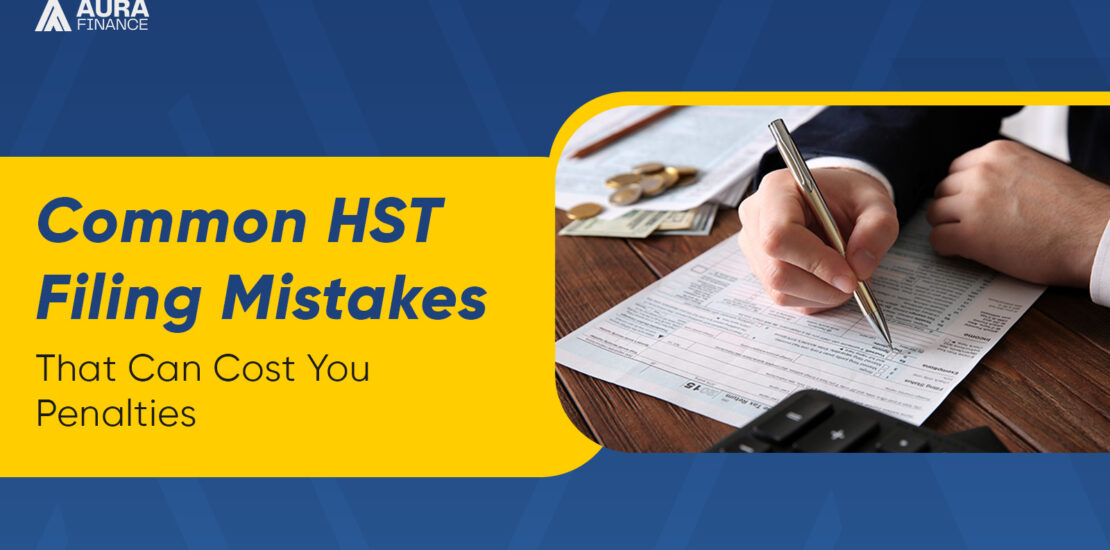- September 5, 2025
- Posted by: Evolvan
- Categories: Accounting, Business plans, Finance & accounting, Tax Audit

For Canadian businesses, managing finances goes beyond just tracking sales and expenses — it also involves complying with government tax requirements like the Harmonized Sales Tax (HST). While it might seem straightforward, HST filing can be tricky, and even small mistakes can cost you thousands in penalties, unnecessary interest, and even potential audits from the Canada Revenue Agency (CRA).
Whether you’re a startup, a growing business, or an established corporation, understanding the common HST filing mistakes — and how to avoid them — is critical for keeping your business compliant and financially healthy.
At Aura Finance Inc, our expert tax accountants in Toronto have helped countless Canadian entrepreneurs navigate the complexities of HST filing seamlessly. Let’s dive deeper into the most common pitfalls and how you can stay ahead.
1. Missing HST Filing Deadlines
The CRA is strict about deadlines, and late HST filings come with automatic penalties. Even being one day late can lead to:
- Interest charges on the unpaid balance
- Penalties based on a percentage of the tax owed
- Negative marks on your compliance history
Example:
If your business collects $15,000 in HST but files late, the CRA may charge interest plus penalties that quickly add up.
How to Avoid It:
- Mark deadlines on your business calendar.
- Set up automatic reminders or work with an accountant in Toronto who manages deadlines for you.
- Use cloud-based accounting tools to track filing periods accurately.
2. Incorrect Input Tax Credit (ITC) Claims
An Input Tax Credit (ITC) allows you to recover the HST you paid on eligible business purchases. However, overclaiming or underclaiming ITCs is one of the most common — and costly — mistakes businesses make.
- Overclaiming ITCs: Claiming HST on personal purchases, non-eligible expenses, or missing proof of purchase.
- Underclaiming ITCs: Forgetting to claim HST you’re entitled to due to poor record-keeping.
How to Avoid It:
- Separate personal and business expenses completely.
- Keep all receipts, invoices, and proofs of payment organized.
- Use accounting software like QuickBooks, Dext, or Xero to accurately track ITCs.
- Partner with professionals offering tax services in Toronto for accuracy and compliance.
3. Misreporting Sales and Revenue
Misreporting taxable sales or incorrectly calculating the HST collected can result in penalties and even trigger audits. This often happens when businesses:
- Fail to distinguish between taxable and exempt sales.
- Forget to include online or out-of-province sales.
- Make manual calculation errors.
How to Avoid It:
- Automate HST calculations using accounting software.
- Understand the difference between taxable, zero-rated, and exempt supplies.
- Consult an accountant in Toronto to review your reports before filing.
4. Ignoring Provincial HST Rate Differences
If your business operates across different provinces, you can’t assume that HST rates are uniform everywhere. Applying the wrong tax rate is a common and costly mistake.
Example:
- Ontario HST: 13%
- Nova Scotia HST: 15%
- Alberta: No HST (GST only)
How to Avoid It:
- Stay updated on provincial tax rates.
- Use integrated accounting software that automatically applies the correct rates.
- Get help from a Toronto-based tax accountant experienced in multi-province compliance.
5. Poor Record-Keeping Practices
The CRA requires you to keep all invoices, receipts, and transaction records for at least six years. Failing to maintain proper documentation can lead to:
- Denied ITC claims
- Delayed refunds
- Difficulty defending yourself during an audit
How to Avoid It:
- Use cloud-based solutions like Dext or Hubdoc to digitally store receipts.
- Set up a dedicated business account to avoid mixing personal and business expenses.
- Organize your files monthly to avoid last-minute stress.
6. Forgetting to File Zero Returns
Didn’t make any taxable sales in a given period? You’re still required to file an HST return. Not filing a zero return can result in:
- Late filing penalties
- CRA compliance notices
- Additional administrative hassles
How to Avoid It:
- File on time — even if your return is zero.
- Set automated reminders or delegate filings to an accountant.
7. Doing It All Yourself
HST filing rules are complex and ever-changing. Many business owners try to handle everything themselves, but DIY filing often leads to:
- Missed deadlines
- Incorrect ITC claims
- Increased audit risks
How to Avoid It:
Outsource your tax filings to a professional accountant in Toronto. At Aura Finance Inc., we handle everything from preparing your returns to ensuring you maximize eligible credits — while staying fully compliant with CRA regulations.
8. Not Reviewing CRA Notices Promptly
Ignoring or delaying responses to CRA notices can escalate minor issues into significant financial penalties. CRA often sends correspondence to clarify discrepancies or request supporting documents.
How to Avoid It:
- Always review CRA letters promptly.
- Provide supporting documents on time.
- Consult a tax expert if you’re unsure how to respond.
Conclusion
Filing your HST returns accurately and on time isn’t just a legal requirement — it’s crucial for protecting your business’s financial health. Small mistakes can snowball into penalties, interest charges, and audits that drain time, money, and energy.
At Aura Finance Inc., we specialize in helping Canadian entrepreneurs avoid these pitfalls. From accurate ITC tracking to ensuring timely filings and compliance across provinces, our experienced tax accountants in Toronto make the process stress-free.
If you want to maximize your tax savings and avoid CRA penalties, we’re here to help.
📞 Contact Aura Finance today to streamline your HST filings and secure your business’s future.
